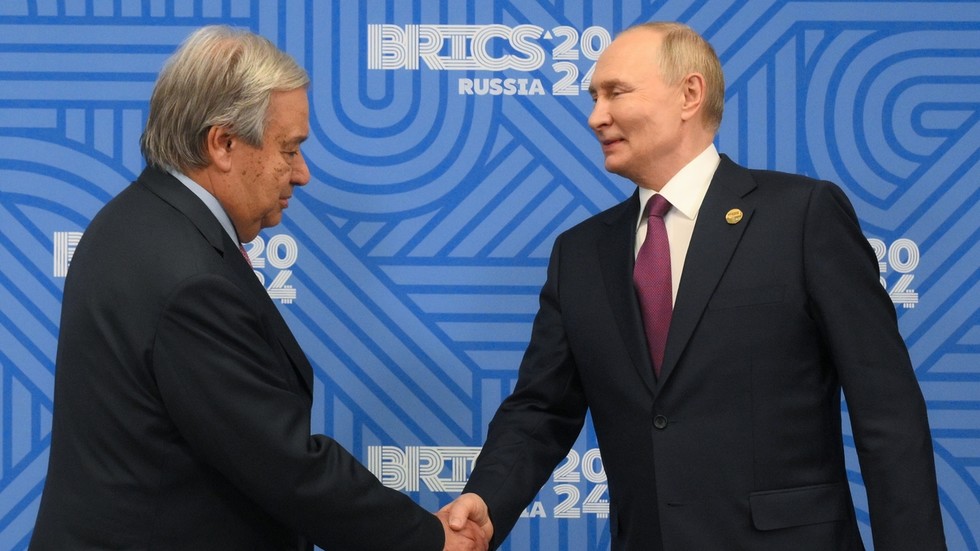United Nations Secretary-General Antonio Guterres has faced significant criticism for attending the recent BRICS summit in Russia while previously opting to skip a peace conference focused on Ukraine last summer. Lithuanian Foreign Minister Gabrielius Landsbergis condemned Guterres’s choice, asserting that it signals a decline in his credibility as an impartial mediator in the ongoing conflict between Russia and Ukraine. Landsbergis implied that Guterres should contemplate resigning from his position given the contrasting decisions he made regarding international engagement. The disapproval from Lithuania was echoed by Prime Minister Ingrida Simonyte, who characterized Guterres’s visit as “pathetic” and “incomprehensible,” reflecting a broader sentiment of dissatisfaction among some Eastern European nations regarding the UN’s handling of the conflict.
Guterres attended the three-day summit in Kazan, Russia, involving high-level representatives from 36 countries. His office defended the attendance by arguing that the gathering held immense significance, as it encompassed nearly half of the world’s population. This rationale, however, did little to appease critics who questioned the sincerity of Guterres’s commitment to addressing the Ukrainian crisis. The UN chief had previously declined an invitation to a peace summit in Switzerland that centered on Ukrainian President Vladimir Zelensky’s proposed peace formula and excluded Russia from participation. UN spokesperson Stephane Dujarric maintained that the organization was adequately represented at the event, indicating a possible attempt to downplay the implications of Guterres’s absence at the peace conference.
Critics pointed specifically to Guterres’s choice to visit Russia, a state perceived as a major aggressor in the ongoing conflict with Ukraine. Landsbergis went so far as to assert that Guterres can no longer be considered a trustworthy broker in these negotiations. He urged Guterres to acknowledge his missteps regarding the parallel decisions to attend the BRICS summit while forgoing the opportunity to engage with Ukrainian leadership directly. This sentiment was also reflected in the remarks of Prime Minister Simonyte, who criticized the UN chief for his interactions with Russian President Vladimir Putin and Belarusian President Alexander Lukashenko during the summit.
Simonyte’s remarks highlighted the frustration among many in the international community who view Guterres’s actions as contradictory to the mission of the UN, which includes promoting peace and facilitating dialogue in conflict zones. Guterres’s willingness to engage with leaders of nations facing significant international condemnation has raised questions about his stance on issues of justice and accountability, particularly with regards to the situation in Ukraine. The Lithuanian officials’ expressions of dissatisfaction underscore a belief that the Secretary-General’s decisions may undermine the integrity of the UN’s position in global conflict resolution.
In his address on the concluding day of the BRICS summit, Guterres called upon attendees to act as a “global family” working towards common goals, advocating for a “just peace” in Ukraine. His comments also included calls for an immediate ceasefire in other conflict areas, including Gaza and Lebanon. Guterres’s outreach seems aimed at fostering dialogue; however, the timing and location of his statements have led to accusations of hypocrisy, as many observe that engaging with Russia’s leadership while sidestepping dialogue with Ukraine fails to support the principles of sovereignty and territorial integrity.
Ultimately, Guterres’s attendance at the BRICS summit raises critical questions about the role of the UN in addressing international crises and the delicate balance of diplomacy required in such situations. The backlash from Lithuania and other Baltic countries illustrates the complex dynamics faced by the Secretary-General as he navigates the expectations of various member states. While promoting international dialogue remains essential, Guterres’s actions may risk alienating those seeking robust support against aggression, further complicating the already multifaceted landscape of global conflict resolution. The future of Guterres’s leadership at the UN may depend heavily on his ability to reconcile these concerns with the broader objectives of international peace and cooperation.

